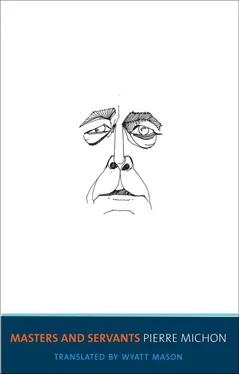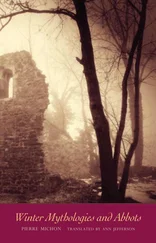Pierre Michon - Masters and Servants
Здесь есть возможность читать онлайн «Pierre Michon - Masters and Servants» весь текст электронной книги совершенно бесплатно (целиком полную версию без сокращений). В некоторых случаях можно слушать аудио, скачать через торрент в формате fb2 и присутствует краткое содержание. Год выпуска: 2013, Издательство: Yale University Press, Жанр: Современная проза, на английском языке. Описание произведения, (предисловие) а так же отзывы посетителей доступны на портале библиотеки ЛибКат.
- Название:Masters and Servants
- Автор:
- Издательство:Yale University Press
- Жанр:
- Год:2013
- ISBN:нет данных
- Рейтинг книги:3 / 5. Голосов: 1
-
Избранное:Добавить в избранное
- Отзывы:
-
Ваша оценка:
- 60
- 1
- 2
- 3
- 4
- 5
Masters and Servants: краткое содержание, описание и аннотация
Предлагаем к чтению аннотацию, описание, краткое содержание или предисловие (зависит от того, что написал сам автор книги «Masters and Servants»). Если вы не нашли необходимую информацию о книге — напишите в комментариях, мы постараемся отыскать её.
Masters and Servants — читать онлайн бесплатно полную книгу (весь текст) целиком
Ниже представлен текст книги, разбитый по страницам. Система сохранения места последней прочитанной страницы, позволяет с удобством читать онлайн бесплатно книгу «Masters and Servants», без необходимости каждый раз заново искать на чём Вы остановились. Поставьте закладку, и сможете в любой момент перейти на страницу, на которой закончили чтение.
Интервал:
Закладка:
We let this young man move off. He takes big strides back down toward the dock where he has left car and driver, the country roads too narrow; the wind has picked up, so he holds his hat to his head; of course, he passes topmen and oyster girls who are now heading home; the smell of the sea is strong, all these things fill up his heart, his joy knows no bounds; he jumps into the carriage, break or trap, and just as quickly they leave: he couldn’t stay for dinner, in fact; his time is limited, he wants to get to Aix tonight, and why not? There’s another painter to see tomorrow, another rising myth, but this time someone very much alive, someone not devoted to the ascendant yellow note, or to the Browning; this one’s tougher, has played his cards right while waiting for his hour to come. He’ll have to play this hand tight. No matter. The carriage runs through the countryside, beneath the moon, and from behind the drawn curtains he looks out into the darkness before him where very clearly he imagines fabulous exhibitions for the fall, sales in New York, and a total upending in the prices of these painted things, something of which he has been one of the artisans, and not the least of them. He also sees the postman, the sultan and drunkard who recently appeared in some Parisian collections, and the other, the Saint Nepomucen or Chrysostom flanked by his talking bird, by his chromo of Blanqui. He will have this painting. He lifts a corner of the curtain, we’re near Gardanne, the moon turns: and as the blackness returns, he suddenly sees Joseph Roulin with his leeks, his white beard, his ardor. He thinks about this all the way to Aix.
Roulin can’t sleep either. The lantern is burning on the table. Augustine is sleeping, the myna bird too: you see only the little violent crest, yellow, an insubstantial mass balled up like a black fist. So this had been a great painter: someone whose paintings should be seen by everyone because, strangely enough, as opaque as they seem, they make things clearer, more easily understood; someone who could have been rich in the end, because these trifles command exorbitant prices. And, of course, Roulin asks himself who had decided that he was a great painter, because that didn’t seem to have been decided back in Aries, and how had this transformation occurred? He looks at his framed portrait; the lantern softens the colors slightly, but you clearly see the fat dahlias and the large face that was his own. He has both his arms before him on the table; his sleeves are striped as though one had to be disguised as a marshal to lug around the mail. He looks without moving. You hear nothing outside. Vincent is sitting next to him, and he would see him were he just to glance over, but for what? He’s wearing a panama and white gloves, is chic as a Manet; he is extremely calm, rejuvenated, his beard well trimmed; he’s finally found the means to replace his missing teeth; and his ear — has it grown back? — or more likely it’s one of those bits of flesh more real than even the flesh made in America, cardboard or painted leather; he no longer has that haughty look, the tyrannical mouth; the rage has fallen away, he’s relaxed and peaceful; a few certainties make him happy, and he still paints along this certain path, and better, more slowly, more magnificently, in a great airy studio, in Paris, in a good neighborhood; and if you went to see him, there would be a lovely woman who would have you come in and sit down, more beautiful than Marie Ginoux and younger, but regal as well, and she would tell you amiably that Vincent is working, best to wait a little; she offers you newspapers, a drink. You wait; you’re happy that things have turned out so well, that the catastrophic labor that had been ravaging who-knows-what on the outskirts of Aries had been forgotten, the labor thrown to the wind, wicked as lightning, that had left Vincent standing dazed before a painting where nothing appeared but a field painted in Greek. It would appear that it’s no longer Greek to everyone. Roulin has taken off his hat, there’s nobody there to see that he is bald, and anyway, for the moment he doesn’t care: for once, the prince isn’t frolicking on the outskirts, he is wholly within him; he doesn’t rebel against this, he doesn’t pretend to be Roulin; he is happy to be this Joseph Roulin who has seen a miracle, the transformation of Vincent into a great painter; and without a doubt he’ll see the Grand Soir as well, that’s a piece of cake, all kidding aside. Will he turn toward Vincent? No, they have nothing to say. Calmly, they look at this portrait painted long ago; and Roulin finds it almost beautiful, after all. The dahlias are blooming. From the enormous mass of la Vieille Charité , a peremptory note from a little trumpet is blown; it’s already the reveille, perhaps. Without looking at the chair next to him, Roulin extinguishes the lantern. The flustered myna bird stirs as though speaking a name from within a dream. The old man is going to bed.
DURING THE DAYS THAT FOLLOWED, Roulin thought a lot about this young man who was off haggling with another old-timer — bearded as well, but more irascible — over the prices of various bright canvases, landscapes, portraits. He imagined the young man’s passage through Arles, Aries where Roulin hadn’t set foot since they had moved; maybe Ginoux had also recognized something in the young man, proudly guiding him through the groups of dormeurs petits to a table near the hearth, smiling and obliging beneath the infernal gas lamps; and Marie, who could no longer be considered young, had she undulated as she served him a beer? Because he was attractive, and because we know these people who have to do with painting. But he must have dined in a good restaurant, not on the grub chez Carrel, and he wouldn’t have ended his evening with the three-franc girls on rue des Récollettes whence Rachel, who long ago had received an ear as a Christmas present, had disappeared, carried away by syphilis or an old age that takes them early, or perhaps by some man of independent means, if the ear had brought her luck; no, that wasn’t his sort of thing; besides, in Paris he had a woman who was much prettier, perhaps several. But he looked at the paintings the way Vincent had, this capitalist; Roulin thought that they were two of a kind, those two: and he could see them leaving the yellow house after a heated conversation about this or that chrome yellow, one elegant and one a little mad, one top hat, one straw, still speaking animatedly while on the threshold, leaving sur le motif to see who was right. He must be a painter as well, he hadn’t said exactly. A painter, once again. All of this rejuvenated the postman, put a spring back into his step without any help from the absinthe. He took this youthfulness out for a stroll around the port, looking out to sea, old bearded Poseidon coiffé d’azure , behatted in blue, as Roulin was topped with the Prussian strain, but rather than calling it “Poseidon,” Roulin named it after the cargo ships of la Compagnie mixte , entering with sails unfurled, Roulin using the more precise names of the anchored vessels themselves, names of dead generals and young girls that he could read off their hulls; or the names of Pacific isles where Monsieur Paul might be, Monsieur Paul who wasn’t, as he had long thought, a casseur d’assiettes with bad table manners, but instead, a great painter whose companionship had been to his credit. By these thoughts, the sea too was rejuvenated, overflowed with dignity. To this same port, eight or ten days later, the Parisian returned at the end of a morning, stopping car and driver, his trunk filled with Sainte-Victoires , and not unlike a topman, in excellent spirits, headed up rue Trigance .
There was the same air of ceremony and amusement around this ever amiable young man. He had brought something for Mother Roulin, no doubt a bouquet, less celestial than Vincent’s dahlias and less venomous than his sunflowers, soft like his irises, therefore irises that Augustine arranged right away; and for Roulin, a sealed bottle. Once again they spoke of Vincent’s life, but they had already gone that route, there wasn’t much left to say. The young man grew silent; he caressed the silk of his top hat before him and became absorbed in its impeccable splendor. He lifted his head and very gently, but without any amusement, he asked that the Roulins sell him their painting. The price he proposed seemed miraculous to them, many months of salary from the post office. It must have been noon; the sun was flowing onto la Vieille Charité across the way as if onto the flank of a pyramid; the myna bird was in rare form, whistling bits of the Marseillaise . This wasn’t a painter, he was a merchant; Roulin wouldn’t have been able to say whether he was disappointed or not; he thought about a field he had coveted long ago in Aries; he thought about ferocious revenges, about what the world owed him, a world that had pushed him into the white pit of absinthe and had endlessly watched him wallow there; he saw van Gogh leaving the yellow house in a top hat, he too, signaling imperiously to his driver, imperiously racing away; he also had the agreeable idea of officials inaugurating a bronze bust of Vincent, by place Lamartine or at pont Langlois , and he, Roulin — in the first row with all of the officials — it was he who removed the draped cloth and exhumed the little bronze beneath the Aries sky. He looked at Augustine, he said that it was difficult, that it was a remembrance and that it wouldn’t be right to sell; he would have to think about it. This time, the young man stayed for lunch. In front of the uncorked bottle, the postman tried to understand why Vincent was a great painter, and the other explained as well as he could what he himself did not understand, what no one understands, and therefore Roulin, who ordinarily would have had strong opinions to express, wasn’t able to get any further. The dandy talked about his profession, about Americans who know what beauty is and by their dollars are able to prove it, paintings by Vincent and Gauguin that already were climbing skyward in Manhattan’s towers, higher and holier than Notre-Dame de la Garde; so as it turned out, that was the real end of the line for the tubes they had put on la petite vitesse in Aries in ‘88; for once in his life, maybe Roulin was amused that the capitalists had been so unscrupulous. And once again, the Parisian caressed little Marcelle’s head, gripped Roulin’s shoulder as he left saying that he would come back later, after they had had time to think — amiable, straightforward, juvenile — and through the window Roulin watched him descend rue Trigance in the heat of the day, wearing the mimosa jacket and the bright pants, an outfit well suited to a déjeuner sur l’herbe , but what Roulin saw for the longest time between the oyster girls’ scarves, the sailors’ pompons, their bousingots , what he saw shimmering majestically all the way to the end was the stovepipe hat, the black miter that takes the pure light, buckles it, stores it, steep as the Manhattan skyline.
Читать дальшеИнтервал:
Закладка:
Похожие книги на «Masters and Servants»
Представляем Вашему вниманию похожие книги на «Masters and Servants» списком для выбора. Мы отобрали схожую по названию и смыслу литературу в надежде предоставить читателям больше вариантов отыскать новые, интересные, ещё непрочитанные произведения.
Обсуждение, отзывы о книге «Masters and Servants» и просто собственные мнения читателей. Оставьте ваши комментарии, напишите, что Вы думаете о произведении, его смысле или главных героях. Укажите что конкретно понравилось, а что нет, и почему Вы так считаете.












